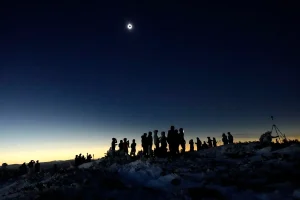If you were in the path of the total solar eclipse last week, you may have observed a change in your environment. The more sunlight that was blocked, the more dramatic the changes.

A range of surface and near-surface meteorological observations can occur during a total solar eclipse. If it was a cloud-free day, or mostly cloudy day, you probably felt a drop in temperature. As the moon crossed in front of sun, it cast a shadow blocking solar energy from reaching your location. While it may have lasted only a few minutes, the reduction in solar radiation would result in a drop in temperature. In some locations, the temperature dropped by as much as 10 degrees. As the sun reappeared, the temperature increased.
A drop in temperature would include a corresponding increase in the relative humidity. So, it might have felt more humid. You may have also observed a change in the wind speed.
The planetary boundary layer, also referred to as the atmospheric boundary layer, is the lowest part of our atmosphere. It is about 0.6 miles thick and is where the atmosphere exchanges energy directly with the ground. The exchanges are primarily mechanical (e.g. wind and turbulence) and thermal. The thermal contact between the boundary layer and the ground surface is a result of the amount of solar radiation.
You may have already observed, in the absence of a storm, that after sundown the wind calms. When the sun sets, the radiative cooling of the ground increases the stability of the lower atmosphere. This reduces the energy exchanges between the atmosphere and the surface. This can result in the wind dying down. The drop in temperature you experienced during the eclipse would similarly cool the ground.
Steve Ackerman and Jonathan Martin, professors in the UW-Madison department of atmospheric and oceanic sciences, are guests on WHA radio (970 AM) at 11:45 a.m. the last Monday of each month. Send them your questions at stevea@ssec.wisc.edu or jemarti1@wisc.edu.

